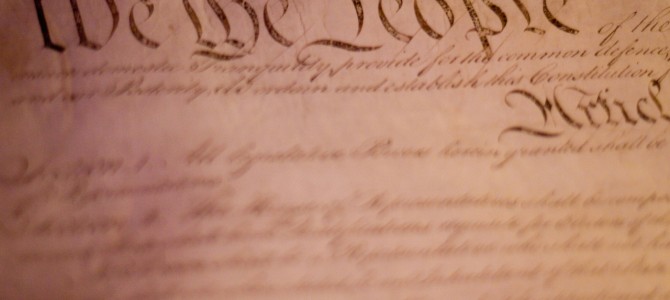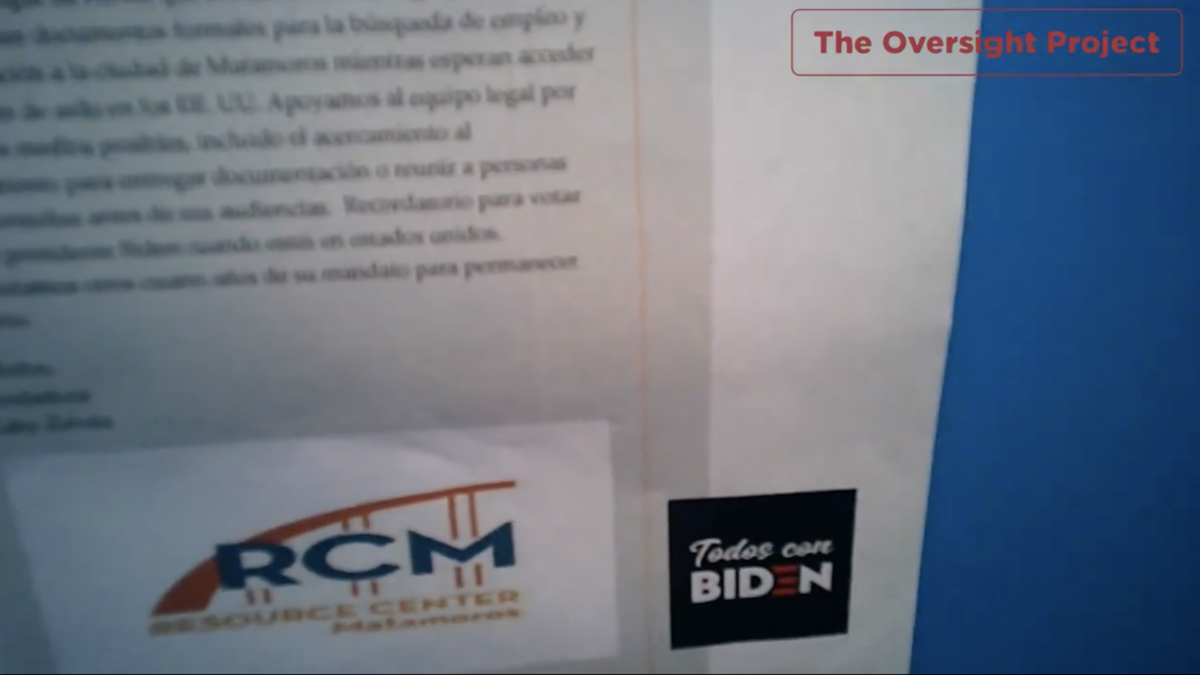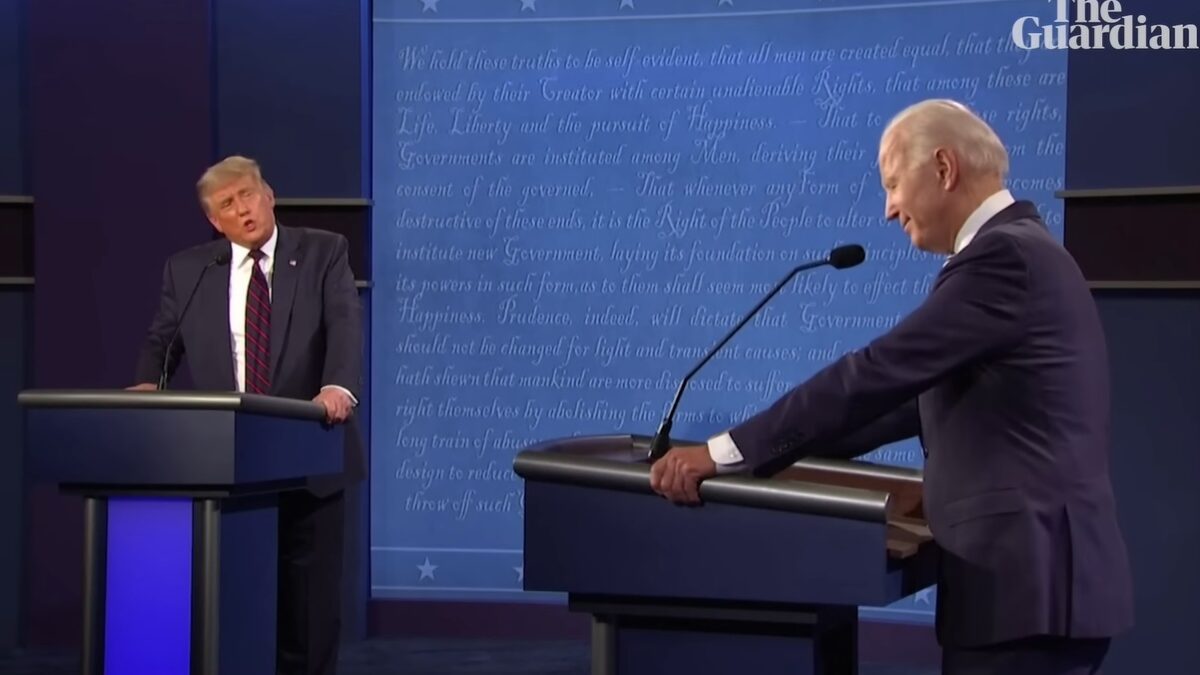
The United States has the second-oldest constitution in the world (second to the United Kingdom, whose unwritten constitution took its major shape around 1688). The longevity of our constitution can lull us into complacency: because it’s lasted so long, we presume its strength and our safety.
In the wake of the worst election in American history, we’ve seen renewed attention to the constitution across the political spectrum. The progressive left has renewed its periodic assault on the Electoral College. Even they have rediscovered the merits of checks and balances, states’ rights, and limits on executive power.
But even some on the winning side have been talking about the constitution. Senator Ben Sasse spoke eloquently to The Federalist Society about the need to protect limited government: “What’s glorious is when people believe in limited government and restraint, when we are the ones in power.” Speaker Paul Ryan has a whole section on constitutional reform in his “Better Way” agenda. In November, former Florida Governor Jeb Bush called for an Article V convention to “pass term limits, a balanced-budget amendment and restraints on the Commerce Clause.”
We Should Welcome Renewed Attention To The Constitution
Bush’s proposals echoed conservative radio personality Mark Levin, who published “The Liberty Amendments“ in 2013. Levin proposed a baker’s dozen of amendments including term limits for congressmen and judges; a balanced budget amendment; a redefinition of the commerce clause; greater congressional oversight of the regulatory power; and (my favorite) the repeal of the 17th Amendment, among others.
We should welcome renewed attention to the constitution. It increases the chances that congress and the courts will actually enforce it, and the executive will stick to it. But it also raises the question: if a window of opportunity is opening during which serious constitutional revision becomes possible, should we take it? If so, in which direction?
Some of Levin’s amendments—like the requirement to file taxes the day before elections, or require voter ID—strike me as constitutional theater, addressing the symptoms, not the causes, of our ongoing political crisis. A couple are terrible ideas that border on extremism (his proposal to allow states to nullify federal laws or amend the constitution without Congress).
Should We Support the Balanced Budget Amendment?
Some are standard conservative red meat that sound good but probably would have worse consequences than the problems they purport to solve. Term limiting congressmen, for example, will only incentivize office-hopping and super-empower congressional leadership who spend a career amassing legislative expertise by moving up the electoral ladder.
Among the most contentious is the proposed balanced budget amendment. The idea has been debated since the dawn of the republic, passed the House in 1995 as part of the Republicans’ “Contract with America,” and failed in the Senate by a single vote.
Despite its popularity with conservatives, the amendment is a terrible idea. As a thought experiment: how would a balanced budget amendment have helped the United States during World War II, when the annual deficit approached 30 percent of GDP? And if you think we can get around that problem by inserting a clause allowing deficit spending during wartime or national emergency, then you’ve taken out all the meaningful teeth the amendment is supposed to have. The balanced budget amendment will either be effective and terrible, or ineffective and pointless.
Why Repealing The 17th Amendment Might Be A Good Idea
Five of Levin’s amendments have real merit to them. First, term limiting federal judges is a good idea. Unlike congressmen, they have no other check on their authority, and thirty-plus years in positions of authority is too much power for any person. Second and third, limiting the commerce clause and eminent domain will blunt the legal tools the government has used to encroach on private property and the free market. Fourth, Congress has already been working to reassert its power over regulatory agencies, including by repealing “Chevron deference” (ask a lawyer if you really want to know). An amendment would further strengthen Congress in this direction.
Fifth, as I have written elsewhere, the repeal of the 17th Amendment may be the single most effective and important means of re-imposing meaningful checks on the national government. Restoring the Senate to its rightful role as representative of the States, not the people, reintroduces a vital mediating institution, restores a prop of republicanism; and takes a step away from the mass plebiscitary democracy (i.e., mob rule) that the Founders rightly feared.
But I think Levin’s amendments leave out several areas that need attention.
The Redistricting Amendment Opens The Door For Corruption
“No State Legislature, elected official, or body composed of elected officials shall have the power to delineate the boundaries of districts for Members of the United States House of Representatives.”
Every 10 years, the states redraw the boundaries of congressional districts to account for population changes. During this process partisan state legislators harnessing big data can essentially pick their voters to guarantee perpetual reelection. They can do the same for their partisan colleagues in the U.S. House.
This is a classic case of using a position of public trust for private gain: the definition of corruption. It is blatantly unjust and a key driver of perpetual incumbency and ideological polarization. Various states have experimented with independent commissions and advisory committees to get around the obvious conflict of interest. The Supreme Court upheld the constitutionality of independent redistricting commissions earlier in 2016. Such commissions can cut down on gerrymandering, increase competition, and decrease polarization. Regardless of the model, it seems obvious that partisan elected officials should not be in charge of drawing the map of their own districts.
We Need To Clarify The Right to Privacy
“The right to privacy shall consist in each citizen of the United States retaining ownership and possession of identifying information about themselves.”
The Ninth Amendment wisely specified that the enumeration of the Bill of Rights “shall not be construed to deny or disparage others retained by the people.” At least one justice invoked the Ninth in the 1965 case Griswold v. Connecticut, which, among other thing, announced a right to privacy. Conservatives have typically criticized the Court for this supposed act of judicial activism, but the problem is really in how the right to privacy has been applied (to cover abortion, somehow), not in the fact of its existence.
The right to privacy should be understood as an extension of the right to property: we own identifying information about ourselves; having such information taken without our consent by the government or by private corporations is a form of theft. The right to privacy is a vital bulwark guarding citizens against concentrations of power in both the public and private sectors, and strikes me as a clear and reasonable implication of existing enumerated rights in the constitution.
Unfortunately, the right to privacy has been twisted and married to the progressive left’s religious devotion to individual autonomy. It was used to legalize abortion in Roe v. Wade (1973), and buttressed Justice Kennedy’s ludicrous idea in 1992 that “At the heart of liberty is the right to define one’s own concept of existence, of meaning, of the universe, and of the mystery of human life.” Of course we have the right to believe whatever we want. But Kennedy’s rewriting of the constitution has now given us the right to public support, validation, and enablement for whatever truth we proclaim and whatever identity we feel like expressing, even at the cost of other human lives. This is a civilization-destroying doctrine completely disconnected with anything rationally covered by “privacy.”
An amendment to clarify in what the right to privacy actually consists would help disentangle an important right from the progressive left’s abuse of it.
What About Religious Freedom?
First Amendment jurisprudence is a maelstrom of Gordian tumbleweeds that I am not competent to untangle. I say it with great trepidation, but we need a new amendment clarifying the freedom of religion and the relationship of religious belief to the state.
The problem is that the progressive left has been steadily shrinking the free exercise clause and militantly policing the establishment clause for everyone else but them. Progressivism is an unacknowledged “political religion” (Jonah Goldberg’s phrase) that seeks to supplant all other religions and belief systems as the official state religion of America. It is, in that sense, theocratic—simultaneously shrinking the role of religion in American life for everyone while expanding it for itself.
That means we need to reinforce the establishment clause by widening it to include belief systems that do not self-identify as religious. We also need to recover the free exercise clause to protect it from creeping state-sponsored progressive “secularism” (which is more accurately described as progressive fundamentalism).
This is the heart of America’s contemporary constitutional crisis. The problem we face is that the national government is no longer the neutral umpire it was designed to be under 18th century classical liberalism. Thanks to a century of progressive governance, the state is now in the business of endorsing certain lifestyles, identities, and private companies against others. The bloat, inefficiency, and corruption of the state stems from its assumption of a quasi-priestly role to adjudicate whose beliefs are on the right side of history and whose are a veiled form of bigotry and hate speech.
The goal of a new amendment would be to restore classical liberal state neutrality. I’m not even sure what the wording should be.
It’s Time To Clarify The President’s War Powers
We need an amendment clarifying the president’s war powers. I differ from some conservatives and libertarians in that I do fret about the president deploying military force without a formal Congressional declaration of war. Contrary to popular belief, there is nothing new about relying on an “Authorization for the Use of Military Force” (AUMF) rather than a declaration of war: it dates back at least to 1798 and President Adams’ “quasi-war” against France.
The 1973 War Powers Resolution laid out reasonable requirements for the president to notify and seek authorization from Congress for certain military deployments. The problem is that every president since 1973 has argued (probably correctly) that the Resolution is an unconstitutional attempt by Congress to regulate the war power without express constitutional authorization.
So let’s give Congress the authorization they need. I’m agnostic on the particulars, but I do agree with the principle that the President’s authority as commander-in-chief should not be absolute and should be subject to some form of Congressional oversight and, in some cases, authorization.
What Other Amendments Might Be Necessary?
There are a few other house-keeping amendments that might help. For example, there should be an amendment expressly authorizing Congress to impose a requirement for national service. I support the government’s right to draft people in wartime, but it has always bothered me that there isn’t explicit authorization to do so. Congress’ power to “raise and support armies” is too vague.
Second, there should be an amendment granting the president blanket authority to reorganize the executive branch while defining and limiting what that authority consists of. As I’ve written before, any executive in any organization would have the authority to reorganize his institution. It is absurd—and it is one of the reasons our government is massively irrational and inefficient—that the President does not have the same authority over the executive branch. This is one area in which Congress has too much authority over the executive.
Third, there should be an amendment expressly forbidding the courts from invoking “evolving standards of decency” or international law. The “evolving standards” doctrine dates from 1958 and is an obvious Trojan Horse for smuggling into constitutional law whatever prejudices, biases, and values are the most fashionable among the intelligentsia at the time. Banning “evolving standards” would effectively enshrine originalism, or something close to it, as the mandate for the judicial branch.
Is It Time For A Constitutional Convention?
How do we pass these amendments? I count twelve amendments, including five of Levin’s and seven new ideas. That would constitute the most ambitious agenda of constitutional reform since the Bill of Rights.
Contrary to Jeb, I do not think an Article V Convention is a good idea. An Article V Convention could quickly become a free-for-all that replaces the existing constitution with something very different (that is, of course, what happened at the last convention). The progressive left will show up with its own wish list, probably including the Equal Rights Amendment; a “common property” amendment about the environment; a wildly different interpretation of privacy; probably something about campaign finance and free speech; and a full-scale assault on the First Amendment.
More to the point, I simply do not believe that any gathering of politicians today would be competent, intelligent, honest, and trustworthy enough to rewrite our constitution. Perhaps an Article V Convention could be possible if all elected officials in America were expressly banned from participating. I’d feel better if the ban extended to tenured university professors.
No, I think these Amendments must become the platform of a new political movement. I’ve called for the resurrection of the Federalist movement in American politics, so perhaps these twelve ought to be the “Federalist Amendments.” That’s not entirely accurate, since some of them don’t touch on issues of federalism. But there’s something to be said for salesmanship.








